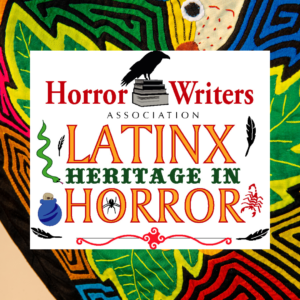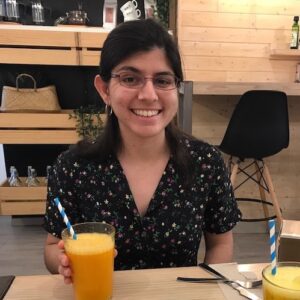Latinx Heritage in Horror: Interview with Angela Acosta


Angela Acosta (she/her/ella) is a poet and scholar of Mexican and European descent who grew up in Gainesville, Florida. She won the 2015 Rhina P. Espaillat Award from West Chester University. Her speculative poetry has or will appear in On Spec, Eye to the Telescope, Radon Journal, MacroMacrocosm, and Shoreline of Infinity. Her work has been featured in Latinx magazines like Panochazine, Somos en Escrito, and Latinx Audio Lit Mag. She is currently completing her Ph.D. in Iberian Studies at The Ohio State University and resides in Columbus, Ohio. She enjoys rock climbing and biking in her free time.
Professional Website: https://sppo.osu.edu/people/acosta.81
Read her work: https://www.alteredrealitymag.com/poets/meet-angela-acosta/
What inspired you to start writing?
I joined my high school’s Writers Club and got in the habit of responding to weekly flash fiction and poetry prompts with friends. It was a fun environment, and I learned a lot about character building and the writing community in Florida. I’ve always been a voracious reader of science fiction but didn’t dabble much in the genre myself as a teen writer. I was busy honing the craft of academic writing in college, so I didn’t write much creative work then. Finally, in 2020, I found myself contemplating the idea of writing speculative poetry. Even though I teach Spanish, I have always loved astronomy and predictions of how far humans may travel in the future. Much to my delight, I found the Science Fiction & Fantasy Poetry Association and I started writing my first speculative poems along the premise of what current humans might wish to convey to future space travelers. Those first tentative forays into speculative genres have grown into what will soon be my first published poetry collection, Summoning Space Travelers.
What was it about the horror genre that drew you to it?
I don’t handle jump scares well, so I wasn’t exactly drawn to horror a secas (by itself). I started encountering horror through the science fiction I was reading, like Alastair Reynolds’s Revelation Space trilogy, and liked what horror can add to the plot at different physical and psychological levels. Personally, horror has helped me to better understand Mexican, Spanish, and other cultural attitudes around taboo topics in the American context, especially death. It helps to untangle belief systems and render different the once familiar, so it’s been a great learning tool for me as a writer.
Do you make a conscious effort to include LatinX characters and themes in your writing and if so, what do you want to portray?
I feature myself as a subject of some of my poetry and I have begun to include other LatinX and Spanish characters in my flash fiction. Because I didn’t grow up exposed to Latinx/Spanish/indigenous cultures, I don’t always find writing these characters as intuitive as others might. However, learning more about my Mexican American heritage and becoming a fluent Spanish speaker have been life experiences that have encouraged me to develop linguistically and culturally diverse characters. My recent speculative poems portray Latinx characters that take to the stars. They make tamales on Mars, develop a new Mayan civilization in the Yucatán Peninsula, and ensure that the future is a tastier, more accepting place.
It (horror) helps to untangle belief systems and render different the once familiar, so it’s been a great learning tool for me as a writer.
What has writing horror taught you about the world and yourself?
My foray into writing horror is only just beginning. Writing some of my more existential work has taught me to embrace emptiness (cosmic and otherwise) and be ok with not knowing some things. Writing horror often puts writers and readers in the face of injustice (and cryptids) and teaches them to confront those roadblocks. I like how horror dismisses the narrative that everything is fine and lets you get on with discussing very real social issues.
How have you seen the horror genre change over the years? And how do you think it will continue to evolve?
I’m a newcomer to the horror genre, so I’m looking forward to seeing new ways of bringing together horror and other speculative genres like cyberpunk, solarpunk, fantasy, hard sci fi, you name it! I’ve seen a lot of innovative writing coming out of literary magazines like Radon Journal, Diabolical Plots, and Cosmic Horror Monthly.
How do you feel the LatinX community has been represented thus far in the genre and what hopes do you have for representation in the genre going forward?
From what I have seen, I’m in awe of how Latinx representation is thriving in speculative genres like horror. The ways writers blend cultural histories, religion, mythology, and the present day leads to some really innovative work and I know they have more in store for us. I’m especially excited about how these genres are represented in graphic novels; I’ve seen some cool Spanish and Portuguese language comics and zines that professors and friends have shared in my graduate program.
Who are some of your favorite LatinX characters in horror?
I’m newer to the horror genre, so none are coming to mind, but I love that writers of all identities are writing more BIPOC and LGBTQ+ characters that exist just as they are.
Who are some LatinX horror authors you recommend our audience check out?
I usually read older sci fi with some horror elements, so there are a lot of contemporary Latinx, Black, Asian, and indigenous writers whose novels I want to read! I was introduced to Isabel Allende early on and I would definitely include Silvia Moreno-García and Zoraida Córdova. I recently read Nicky Drayden’s Escaping Exodus books and love the vibrant worldbuilding and the philosophical implications of the body horror.
What is one piece of advice you would give horror authors today?
Encourage others to make their way to the genre and to join professional organizations like HWA, SFPA, and SFWA. You might just find a new favorite writer or your next story idea!
And to the LatinX writers out there who are just getting started, what advice would you give them?
There are so many ways to express your multifaceted identities and those of your characters. Your characters don’t need to speak Spanish or have certain names to authentically represent your vision for the piece. There is so much possibility within speculative writing for different ways of living and being and I am grateful to have found communities in the speculative journals I have contributed to.



